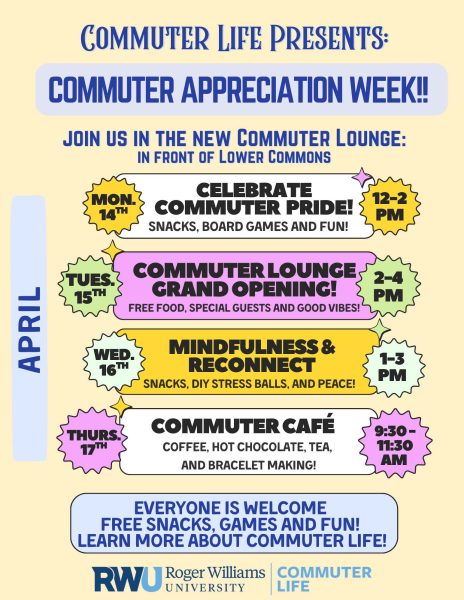Indigenous in Rhode Island
RWU hosts conversation reflecting on local Indigenous history
The second Monday of October is often thought of as a day off from school to celebrate Columbus Day, or for an increasing majority of people, Indigenous Peoples’ Day. For many people around the country, this day is a reminder of what Indigenous people have had to endure as America became the country it is today. This year is the 400th anniversary of the Pilgrims landing on Plymouth, Massachusetts, which also led to the first treaty between the Pilgrims and the Pokanoket Nation, who were already inhabiting the land.
RWU invited Sagamore William Guy or Winds of Thunder from the Pokanoket Nation and Lorén Spears, executive director of the Tomaquag Indigenous Museum, to share the experiences of Indigenous people within the local Rhode Island community in the 400 years since the Pilgrims’ landing.
The event titled “Indigenous in Rhode Island: Reflections on Courage and Community” was sponsored by the Office of the President, The Provost’s Office, The Multicultural Student Union (MSU) and Student Senate. The webinar was available to the RWU community and members of the local community.
The event started with an intertribal drum circle as the speakers waited for attendees to login into the Zoom event. The circle was performed by representatives of multiple Indigenous groups in Rhode Island who had previously performed at RWU in September 2018, in memory of the late former President Donald Farish, who partnered with different tribal nations throughout the region.
Once the event started, associate history professor Dr. Charlotte Carrington-Farmer, associate professor of anthropology Dr. Jeremy Campbell, Provost Margaret Everett and President Ioannis Miaoulis each spoke on the importance of the event and what it means to them to be able to participate in an event focusing on the Indigenous in Rhode Island conversation.
The Sagamore of the Pokanoket Nation William Guy was then introduced. Provost Everett started the conversation by asking the Sagamore his thoughts on the initial moment of contact between the Pilgrims and the Pokanoket tribe. He went on to describe the struggles the Pokanoket people faced both before and after their contact with the Pilgrims, including the violence the tribes endured.
Growing up, William Guy still faced the struggles his ancestors faced centuries earlier. He was instructed to not speak of his ancestral ties to King Philip, the massasoit that had been slaughtered by the colonists. In adulthood, he discovered that his daughter was labeled “white” on her birth certificate. By the time his daughter went to get her license, her birth certificate had been changed to include her native lineage. The same thing happened when he went to the Fall River Town Hall to get his parents’ marriage license.
Guy spoke on the many times his native identity had been erased or hidden during his life. These erasures had been prevalent since King Philip’s War when a law was passed that stated any male over the age of 14 could be killed on site for proclaiming their Pokanoket identity. The law faded out over many years but The Sagamore says that as of 2000, the law was still a valid law. In conclusion to this statement, Guy said, “Pokanoket is a native not readily recognized, like we are invisible, we don’t exist… They know our leaders’ name but they omit the name Pokanoket.”
The Pokanoket’s history remains alive because the tribe continues on. They are active and vibrant members of the community. Guy described some events the tribe actively participates in like the Strawberry Thanksgiving celebrated in June, the memorial to King Philip where he was killed and work with the Audubon Society in Rhode Island. They also put programs on to further the community’s education on native history.
The next guest speaker was Lorén Spears of the Tomaquag Indigenous Museum located in Exeter, Rhode Island. Spears is a member of the Narragansett-Niantic Tribe. She spoke of her ancestors suffering at the hands of colonists and the pain they still feel to this day. About King Philip’s War, she said, “King Philip’s War not only broke that [relationships between tribes], but literally broke the power for Indigenous people in this region as a whole and began the unrelenting subjugation of Indigenous people here.”
Spears went on to discuss what Provost Everett referred to as “language revitalization” which Spears would change to “language continuation.” Spears spoke on the importance that language has played in the history of Indigenous people and how it makes the people who they are.
One of the topics that arose led to Spears discussing the names in her family. When she was born, Lorén Spears went on her birth certificate even though she has an Indigenous name. She was born in the Civil Rights Era and it had been frowned upon for many years prior to legally name a child with their Indigenous name. Once Spears had her own children, she chose English names that could easily be translated to an Indigenous name. She discussed how overtime, Indigenous people have reclaimed their native roots and intertwined them with English norms. She ended the discussion by saying how happy she was that her grandchildren’s legal names are Indigenous names.
The event largely focused on having a conversation of how history in American classrooms is not the same history remembered by the Indigenous people of the land the schools sit on. Spears and Guy both discussed the erasure and invisibility of their heritage even up to modern times. Spears spoke on the overlap of Indigenous history and colonists history:
“When you have no voice, you have no say and just as we were written out of the history books in the 1880s, before that but really after that, because now it said that we didn’t exist,” Spears said. “So, therefore, we were completely written out of history but, who gets to write those history books? Again, no voice. And it’s this repetitive pattern of conquest that keeps happening and it happens in [the] modern era.”
At the end of the conversation with Spears, Dr. Campbell turned to Student Body President Samuel Avila, Student Body Treasurer Jacob Hartzler and MSU President Jeraldyn Ramirez for questions that were answered by Spear and Guy. The questions focused on the relationship between the tribes and RWU, COVID-19 and how students can become involved with the movement to recognize tribal communities.
Emily Dvareckas graduated from RWU in 2022 with a degree in forensic science. She spent three years with The Hawks’ Herald as the photo editor...




